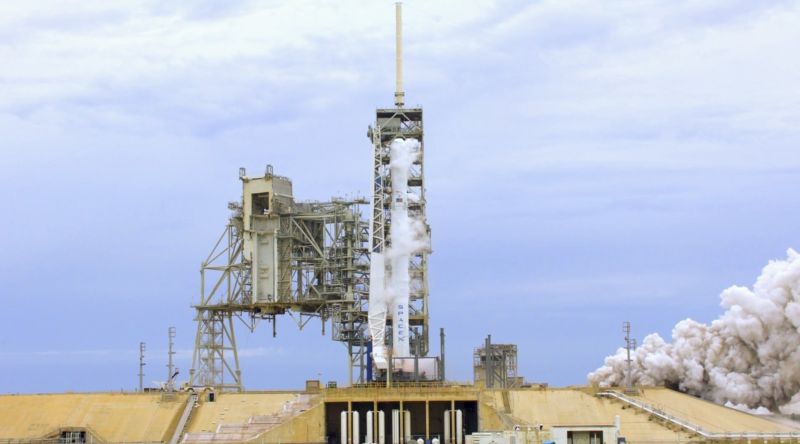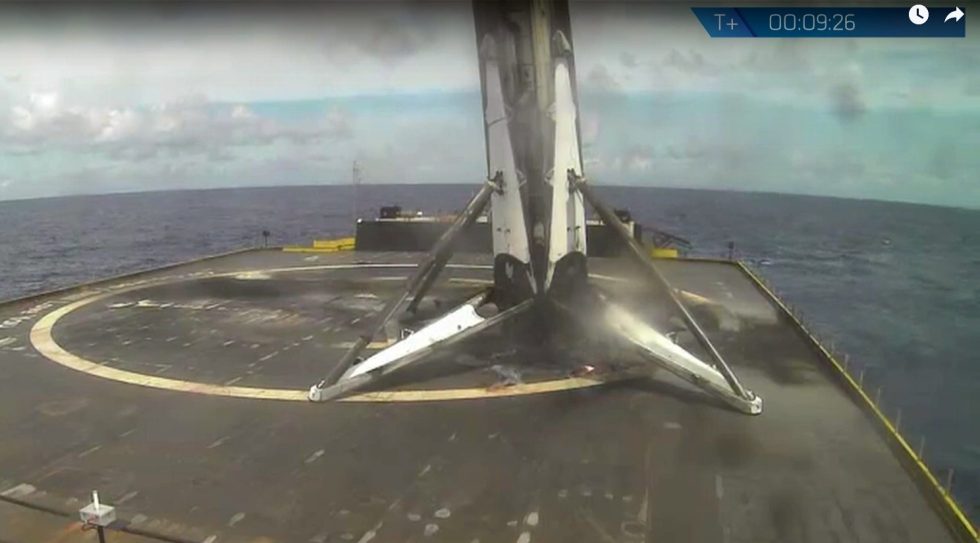
3:30pm ET Update: Under nearly perfect skies in Florida, SpaceX successfully launched the BulgariaSat-1 on its way to geostationary transfer orbit Friday afternoon. The "flight proven" booster made its second flight, and provides further indication that reusable rocketry isn't going to be an aerospace fad. It is, rather, likely the future.
The company also demonstrated its increasing proficiency with regard to booster landings. Although Elon Musk didn't provide technical details, he said the reentry force and heating faced by this booster would be greater than that of any previous flight. Despite this technically challenging, three-engine landing, the rocket made it back to a droneship in the Atlantic Ocean.
The first-stage booster was singed, smoking and listing—and near the edge of the droneship. But the rocket had made it home in one piece. "Rocket is extra toasty and hit the deck hard (used almost all of the emergency crush core), but otherwise good," Musk tweeted a few minutes following the landing.

2:30pm ET Update: During preparations for today's launch, SpaceX engineers decided to run additional ground system checks, although the company reported that the Falcon 9 rocket and its payload are in good health. This reset the estimated liftoff time to an hour into the launch window, 3:10pm ET. The webcast below should go live about 15 minutes before that time.
Additionally, SpaceX founder Elon Musk has interjected a little bit of intrigue into this afternoon's launch by noting on Twitter, "Falcon 9 will experience its highest ever reentry force and heat in today's launch. Good chance rocket booster doesn't make it back." We should soon find out.
Original entry: It's a big weekend for SpaceX, the California rocket company that has already had a big year. On Friday, the company will attempt to launch BulgariaSat-1, a commercial communications satellite, to a geostationary orbit. On Sunday, the company will attempt to launch a second batch of Iridium satellites into low Earth orbit. If successful, this weekend would put the company on pace for a record-smashing number of missions this year.
Big weekend
The BulgariaSat-1 launch was delayed from earlier this week due to a payload fairing issue, but that appears to have been resolved. The flight is notable because it marks only the second time the company has flown a "used" rocket back into space. The five-month turnaround on this booster has been much shorter than SpaceX's first reflight in March—this first stage was last used during a January 14 launch from California.
Friday's launch will occur at Kennedy Space Center in Florida, where weather conditions appear to be nearly ideal for a rocket launch. The launch window opens at 2:10pm ET (7:10pm BST) and will remain open for two hours. Following stage separation, and about eight minutes after today's launch, the Falcon 9’s first stage will attempt a landing on the Of Course I Still Love You droneship.
Then, on Sunday, SpaceX will attempt to launch a new Falcon 9 rocket from Vandenberg Air Force Base in Southern California. This is the company's second launch of a new constellation of communications satellites for Iridium. This launch will lift 10 Iridium NEXT satellites to low-Earth orbit. Liftoff is presently scheduled for 4:24pm ET on Sunday (9:24pm BST). If successful, it would be SpaceX's ninth Falcon 9 launch this year.
Big year
SpaceX's successes are starting to stack up this year. Already, the company has reached major milestones by reflying a first stage booster, and in early June it also flew a used Dragon spacecraft. Both NASA and the US military have begun to notice, as leaders with both have indicated a willingness to consider flying some of their missions on "flight proven" rockets.
This weekend presents SpaceX with a major opportunity to make good on another one of its promises, to increase its flight rate. The company's previous record for successful launches in a calendar year is eight, set last year before a September 1 accident prevented the company from flying the rest of the year. By the end of this weekend, SpaceX could have run its total flights for 2017 to nine flights in just the first half of the year.
Such a first half would bring SpaceX close to a pace that might allow the company to achieve its ambitious goal of more than two dozen launches this year. This is significant because launch competitors in the United States, Europe, Russia, and elsewhere that struggle to compete with SpaceX on price will often counter that the company can't meet its launch commitments. A SpaceX that meets its flight rate goals is warily referred to as a "steamroller" by some French rocket officials.
reader comments
225